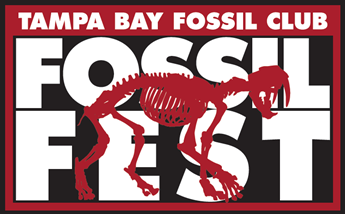Our Meetings
Guests are always welcome to the meetings if you would like see what
we're all about. Meetings start at 7:00 pm and usually take place the
first Saturday of the month, unless there is a holiday, then it's on
the second Saturday of the month.
Located at the USF Behavioral Science Room #103.
After the speaker finishes we have a short break. Then we
draw for door prizes and some raffle items as well. We finish with
any final announcements.
Upcoming Meetings and Guest Speakers (2025-2026 season):
NOTE: All meetings are the first Saturday of the month at 7:00 pm
unless otherwise clearly noted.
Sept. 6 - Patty Moore, President of the Paleo Preserve
A Brief History of Leisey, the Legend and Legacy
Patty Moore is the President of the Paleontological
Education Preserve; aka
Paleo Preserve Fossil Museum. She’s done many
jobs through the years
from chemist to zookeeper
but her children’s interest
in fossils brought her to
paleontology. If you’ve
been around TBFC for a
minute or some years, you
probably already know
Patty. She can be found at most TBFC meetings, sometimes giving
us updates on the Paleo Preserve, and volunteering at FossilFest
each year.
If you’ve heard some of the “old timers” talking about hunting
fossils at the Leisey Shell Pit and wondered what they were talking
about, come and learn! Patty will share the history of the Leisey
Shell Pit, its significance in Florida’s fossil history, how it relates to
the Tampa Bay Fossil Club, and its impact on the Florida Museum of
Natural History fossil digs.
Oct. 4 - Aaron Woodruff
Prehistoric World
When dinosaurs disappeared, mammals began to thrive and take
center stage. Prehistoric World invites readers
into this fascinating
chapter of natural history, featuring detailed
species accounts by
Aaron Woodruff, who
manages vertebrate
paleontology collections at the Florida Museum of Natural History. The book is further
enriched with vivid artwork by renowned paleoartist Julius
Csotonyi.
Titled Prehistoric World: Over 1,200 Incredible Mammals and Discoveries from the
Mesozoic and Cenozoic, the book highlights the
rise of warm-blooded animals after the dinosaurs’ extinction. Aaron presents
engaging details about each species, covering their
diets, habitats, and behaviors, while blending scientific accuracy
with storytelling.
Well-known Ice Age icons such as mammoths and saber-toothed
cats are included, but readers will also encounter many lesser-known species
unearthed in more recent discoveries.
“Bear-dogs are among my favorite ancient predators,” Woodruff
explained. “Before the great cats evolved, they dominated landscapes across
the Northern Hemisphere and Africa.”
Prehistoric World also sheds light on ancient mustelids, the ancestors of
today’s weasels, badgers, and wolverines. Unlike their modern relatives, these
carnivores could grow as large
as wolves or jaguars during the Oligocene and Miocene periods, making
them capable hunters of
deer- and horse-sized
prey.
The artwork in Prehistoric
World will grab people’s
attention and spark their
imagination.
Aaron devoted seven
months to researching and
writing the book, often
working nights, weekends,
and holidays while maintaining his full-time role at
the museum. He even finished Prehistoric World on his birthday.
“This is exactly the type of book that ten-year-old me would have
cherished,” Aaron recalls. As a child, he was captivated by dinosaur
books, often making his own versions by drawing creatures, writing
descriptions, and stapling the pages together.
Some species proved challenging to document, since many were
described centuries ago with minimal context. In these cases, Aaron turned to
Greek and Latin dictionaries to decode their scientific
names. He also coined common names when none existed, for
instance, Miopanthera lorteti became “Lortet’s cat,” and Tremarctos floridanus
was given the name “Florida spectacled bear.”
“Much of the fossil record comes down to isolated teeth,” Aaron
says. “If we’re lucky, those teeth are still attached to jaws.” Even
so, paleontologists can deduce a surprising amount of information,
such as diet, age, and sometimes sex, from these limited remains.
Aaron says his younger self “would have been ecstatic” to know he
would one day publish a book on paleontology. Though marketed
primarily toward children, Prehistoric World is designed to appeal
to readers of all ages, offering both fresh knowledge about prehistoric mammals
and a greater respect for the diversity of life, past
and present.
Come to the October meeting to see Aaron’s presentation and
learn more about our Prehistoric World! We’ll have plenty of copies of the
book on hand for purchase and for Aaron to sign.
Nov. 8 - Annual Auction
TBFC Scholarship Auction
Dec. No Meeting
There is no club meeting in the month of December.
Jan. 10 - An Equus Dominated Middle Irvingtonian Site with Dr. Bob Sinibaldi and Joseph Branin
(or Joe and Dr. Bob Go Diving)
About half a million years ago, several horses, sloths, armadillos
and other animals fell into a sinkhole in Florida’s Big Bend region
and died. Over time, sediment filled the pit, preserving the animals
until fossil collectors Dr. Bob Sinibaldi and Joe Branin discovered
them in 2022 while diving in the Steinhatchee River.
The tannin-filled water makes visibility extremely poor. “It’s like
diving in coffee,” Dr. Bob explained. After an unproductive day of
hunting, Joe spotted horse teeth, followed by a hoof core and a
tapir skull. The discoveries quickly multiplied, many in pristine condition.
“It wasn’t just quantity, it was quality,” Dr. Bob said.
As the Steinhatchee River slowly shifted course over thousands of
years, it eventually eroded into the ancient sinkhole, washing fossils
onto the riverbed. Paleontologists at the Florida Museum of Natural History
determined the fossils date to the middle Irvingtonian, a
poorly documented period of the Pleistocene ice ages. Before this
discovery, only one Florida site had yielded fossils from this time
period.
“The fossil record everywhere is lacking this interval,” says Rachel
Narducci of the Florida Museum. The site helps fill a major evolutionary gap,
particularly for animals that changed size and form
during this period.
One example is the extinct armadillo-like genus Holmesina. Earlier
species averaged 150 pounds, while later ones grew to nearly 475
pounds. Fossils from the site show animals with the larger body
size but older skeletal features, revealing that size increased before
bone structure adapted.
Roughly three-quarters of the 552 fossils recovered so far belong to
early caballine horses. Their abundance suggests the area was once
open grassland, unlike today’s wooded landscape. The horse fossils
are unusually complete, allowing scientists to study teeth and diet
in ways rarely possible.
The site also produced an unusual tapir skull with mixed features.
While it may represent a new species, researchers say more material is needed.
Dr. Richard Hulbert emphasized that the discovery highlights the
importance of collaboration between hobby collectors and scientists.
Further excavation will be slow due to the underwater conditions, but
researchers believe many more fossils remain to be uncovered.
Come to the January 10 meeting to see Dr. Bob and Joe’s presenta-
tion on this Middle Irvingtonian site and to see some of the fossils
coming out of the location.
Feb. 7 - Terror Bird: Florida’s True Dinosaur
by Thomas Goss, Director
At our February meeting,
film student Thomas Goss
will discuss his movie,
Terror Bird: Florida’s True
Dinosaur. In his presentation, Thomas will uncover the story of Florida's
Terror Bird, Titanis
walleri. This documentary paints a picture of Titanis as it may have
lived, hunted, reproduced, and survived in a world it was not inherently suited
for. Featuring interviews with paleontologists digging
up the secrets of Florida’s past, and experts on modern birds from
raptors to emus to understand Titanis’ modern relatives.
Thomas will go behind-the-scenes into how he created the documentary,
his inspirations, his visual effect processes, creative decisions
for approaching Titanis, and more.
Thomas Goss is a film student, director, and visual effects artist
from Santa Fe College, Gainesville. He created
“Terror Bird: Florida’s True Dinosaur” as a passion project for one of his
classes in the
school’s Multimedia Production Program. The project was born out
of Thomas’ love for prehistory and the Florida Wilds, as well as being heavily
inspired by classic paleo-documentaries he grew up
watching. The project premiered its first cut at the 2025 Orange
and Blue Film Festival at the University of Florida, showing alongside
30 college and high school films from across the state. Out of
the 30 films, the documentary was voted Audience Choice for Best
Film and awarded Excellence in Visual Effects.
Mar. 7 - TBD
Apr. 4 - TBD
May 2 - TBD
June 6 - End of Season Dinner
View Our Past Virtual and In-Person Meetings
COVID-19 had forced us to adapt!
Since in-person meetings were not possible during that time, the club
hosted Virtual Live Meetings on our YouTube channel.
Since COVID, we've tried to record in-person meetings and upload them to the site too. Unfortunately not all meetings are able to be recorded but please check the channel for any new content.
Subscribe to the channel to get notifications when we go live or a new video is uploaded!
All our club live streamed or recorded meetings will be saved and can be re-watched anytime! Not all meetings can be recorded for various reasons.
You can view past virtual or recorded meetings in the playlist below:


